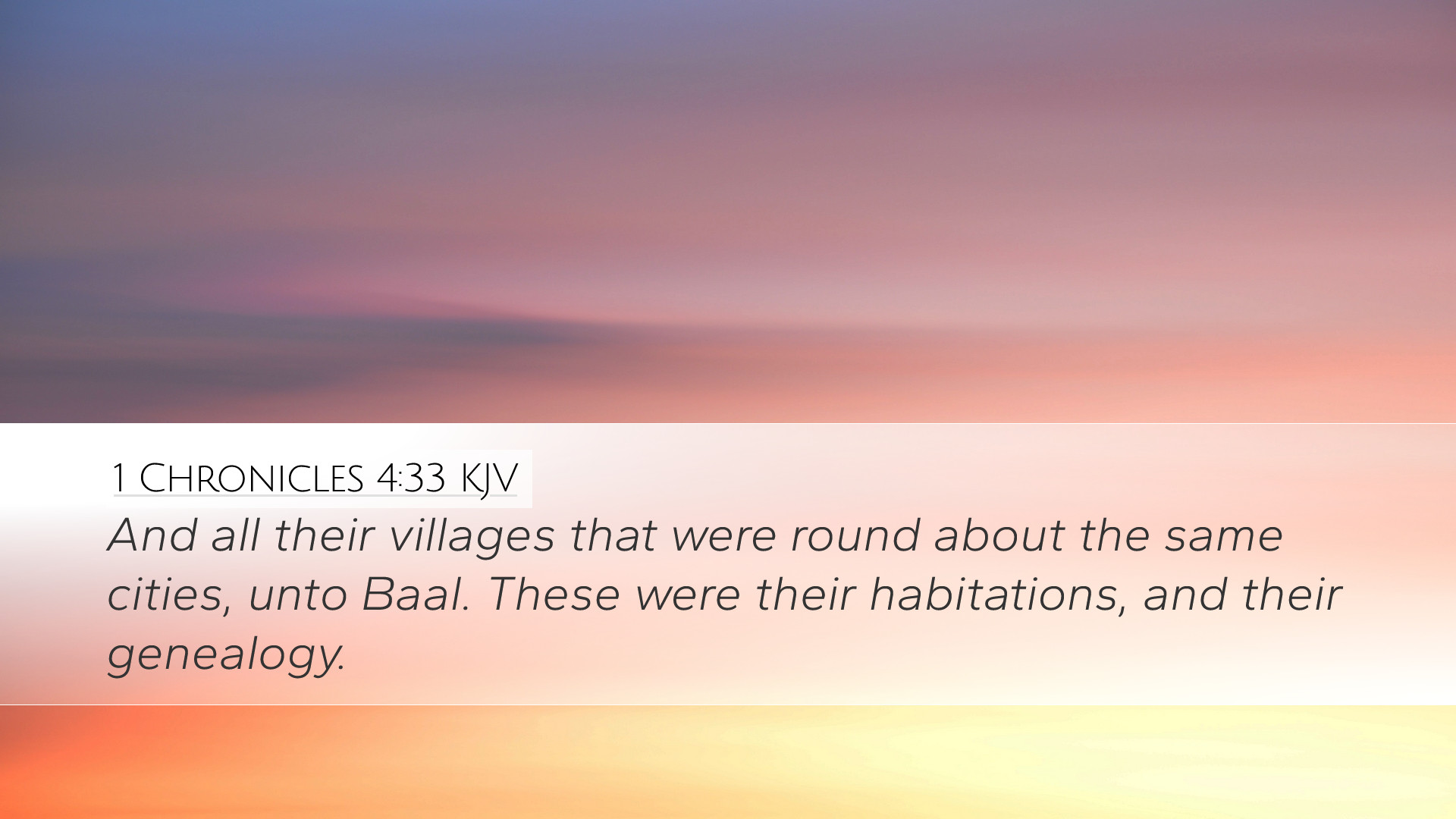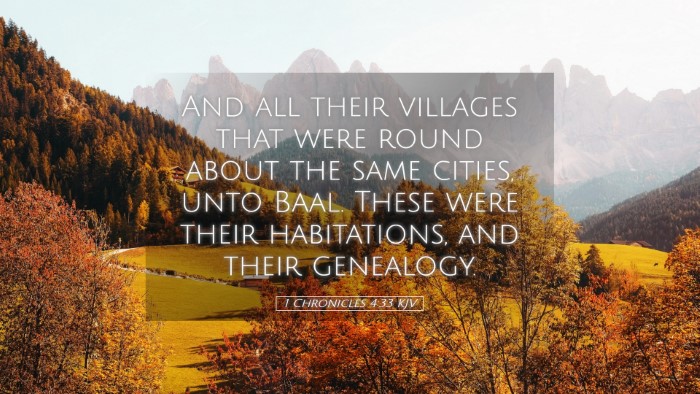Commentary on 1 Chronicles 4:33
1 Chronicles 4:33 states: "And all their villages that were round about the same cities, unto Baal. These were their habitations, and their genealogy was ancient." This verse provides a glimpse into the genealogical records of the tribe of Judah, emphasizing the significance of community, habitation, and legacy. Below is a synthesis of insights from notable public domain commentaries.
Contextual Background
The genealogical records in 1 Chronicles serve to establish the lineage and heritage of Israel, particularly the tribe of Judah. In a historical context, these records were crucial for identifying the rightful families and their respective responsibilities within the community.
Insights from Matthew Henry
Matthew Henry emphasizes the importance of recognizing the settlements that formed around significant cities. He notes that the mention of specific villages indicates a structured society. Here are some of his key observations:
- Community Structure: Henry highlights that the villages surrounding the cities demonstrate a connected community that relies on the central city for governance and protection.
- Ancestral Roots: The term "genealogy was ancient" suggests a long-standing heritage, indicating the enduring legacy of these families, which is vital for their identity.
- Faithfulness in Settlements: He views the villages as places of God’s provision and faithfulness, where the inhabitants were meant to thrive under divine blessing.
Insights from Albert Barnes
Albert Barnes provides a detailed exegesis, focusing on the social and cultural implications of the verse:
- Geographical Significance: Barnes comments on the practical aspects of habitation, mentioning that settlements were strategically placed to foster agricultural productivity and security.
- Historical Continuity: He remarks that the mention of "ancient" genealogy emphasizes continuity in leadership and family roles throughout generations.
- Implications for Worship: Barnes notes that such community structures were essential for collective worship practices, facilitating gatherings and religious observances.
Insights from Adam Clarke
Adam Clarke’s observations delve into the linguistic aspects as well as the theological implications of this verse:
- Linguistic Analysis: Clarke investigates the original Hebrew terms, providing insights into their meanings. The use of "Baal" indicates the cultural and religious influences that shaped the identity of these communities.
- Theological Reflections: He argues that the habitations mentioned reflect not only physical dwellings but also denote spiritual domains where God's presence is acknowledged and worshipped.
- Heritage and Covenant: Clarke connects the notion of genealogy with God’s covenant with Israel, asserting that every inhabitant had a role in fulfilling divine promises to Abraham, Isaac, and Jacob.
Pastoral Applications
For pastors and spiritual leaders, the insights drawn from 1 Chronicles 4:33 can foster rich theological discussions and applications:
- Identity in Christ: The theme of genealogy points to the importance of identity in our relationship with God through Christ, who is the fulfillment of the promises to Israel.
- Community Importance: Emphasizing the role of communal life, pastors can encourage congregations to recognize their interdependence and the need for mutual support and worship.
- Covenant Legacy: The significance of heritage reminds leaders to nurture faith across generations, ensuring that the teachings of the Scripture are passed down faithfully.
Theological Implications
Scholars and theologians may find the following aspects compelling:
- Divine Order: The structured community presented in this verse illustrates God’s design in human society and His intention for us to live in harmony.
- God's Faithfulness: The reference to ancient genealogy serves as a testament to God’s unchanging nature and His promises that stand through time.
- Historical Context: Scholars can analyze how these genealogical records were meant to preserve identity and accountability among the people, shaping Israel’s religious and cultural narrative.
Conclusion
In essence, 1 Chronicles 4:33 encapsulates the importance of memory, community, and divine covenant in the lives of the Israelites. As we reflect on these early records, we recognize their relevance today, offering timeless lessons on identity, community, heritage, and faithfulness in our walk with God.


